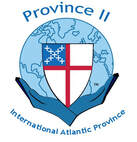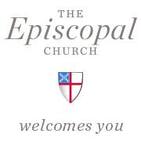Province II Nominations Committee Report from the Chairperson
From Chairperson Yvonne O’Neal
I am pleased to share the report of the Provincial Council Nominating Committee. All incumbents eligible for re-election have said yes.
This is the slate of nominees:
President: Bishop DeDe Duncan-Probe
Vice President: Archdeacon Walter Baer
Secretary: The Rev. Jimmie Sue Deppe
Treasurer: Ms. Lis Jacobs
Episcopal Representative to Provincial Council: Bishop Caryle Hughes
Clergy (Deacon or Presbyter) Representative to Provincial Council: The Rev. Canon Johnnie Ross
Lay Representative to Provincial Council -- Two nominations were received:
I am pleased to share the report of the Provincial Council Nominating Committee. All incumbents eligible for re-election have said yes.
This is the slate of nominees:
President: Bishop DeDe Duncan-Probe
Vice President: Archdeacon Walter Baer
Secretary: The Rev. Jimmie Sue Deppe
Treasurer: Ms. Lis Jacobs
Episcopal Representative to Provincial Council: Bishop Caryle Hughes
Clergy (Deacon or Presbyter) Representative to Provincial Council: The Rev. Canon Johnnie Ross
Lay Representative to Provincial Council -- Two nominations were received:
- § Adam Hamilton-Ferguson, DioCNY
- § Yamilka M. Maldonado Mitchell, DioPR
- § Archdeacon Walter Baer, Europe
- § The Rev. Theodora Brooks, DioNY
- § The Rev. Luke Fodor, DioWNY
- § The Rev. Keith McCoy, Deacon DioNJ
- The Rev. Diana L. Wilcox, Diocese of Newark - nominated by petition
The Synod of Province II Announces that Nominations are Open!
Election of officers and other key positions will occur at the Province II Synod, scheduled for May 9, 2024. The Nominating Committee is seeking nominations for the following positions, all of which are three-year terms, except Member of Executive Council, which is a six-year term:
Nominations should include all appropriate contact information and a brief (150 word) biographical sketch relevant to church and business background activities.
Nominations should be sent by email to Yvonne O’Neal, Chair of the Nominations Committee, [email protected].
Nominations should be received not later than February 9, 2024.
- President (Bishop DeDe Duncan-Probe is eligible for re-election)
- Vice President (archdeacon Walter Baer is eligible for re-election)
- Secretary (The Rev. Jimmie Sue Deppe is eligible for reelection)
- Treasurer
- Episcopal Representative to Provincial Council (Bishop Caryle Hughes is eligible for re-election)
- Clergy (Deacon or Presbyter) Representative to Provincial Council (The Rev. Canon Johnnie Ross is eligible for re-election)
- Lay Representative to Provincial Council
- Clergy Provincial Member of Executive Council of The Episcopal Church
Nominations should include all appropriate contact information and a brief (150 word) biographical sketch relevant to church and business background activities.
Nominations should be sent by email to Yvonne O’Neal, Chair of the Nominations Committee, [email protected].
Nominations should be received not later than February 9, 2024.
|
President
(a) The President is elected by the Provincial Synod. (b) The President is the presiding officer of the Provincial Council and, ex-officio, a member of the Provincial Synod and of all committees, commissions, networks, and departments. (c) The President presides at all meetings of the Provincial Synod and Provincial Council and, when the Houses of the Provincial Synod meet separately, presides over the House of which the President is a member. (d) The President, with the advice of the Provincial Council, sets the time and place for meetings of the Provincial Synod and Provincial Council, appoints members of committees, and fills officer vacancies on an interim basis. (e) The term of office of the President is one triennium, beginning at the close of the Synod at which elected. No elected officer may serve more than two consecutive triennia. Secretary
(a) The Secretary is elected at Provincial Synod from either the clerical or lay order , by a concurrent majority of all votes cast in each House. (b) The duties of the Secretary are: (i) To record the minutes of the meetings of the Synod and Provincial Council, including recording the names of all persons entitled to a seat, voice or vote and declaring a quorum (ii) To report to the Provincial Synod and the Provincial Council on matters referred to the Provincial Synod by the General Convention, the Executive Council or by any of the Dioceses (iii) To communicate to the officers of the General Convention or to the officers of the Dioceses of the Province, the action of the Provincial Synod or the Provincial Council on matters referred to it or them (iv) To notify officers and members of the committees of their election or appointment and (v) To perform such other duties as may be required by the Constitution and Canons of the General Convention, by the Ordinances of the Province, by the Provincial Synod or either House thereof, or by the Provincial Council. (c) The term of office of the Secretary is one triennium, beginning at the close of the Synod at which elected. No elected officer may serve more than two consecutive triennia. |
Vice President
(a) The Vice President is elected by the Provincial Synod and is, ex-officio, a member of the Provincial Synod. (b) The Vice President cannot be a member of the same House as the President. (c) If the President is temporarily disabled from fulfilling the duties of office, the Vice President serves as President during the incapacity, and in the case of a vacancy in the office of President, the Vice-President serves as President for the duration of the President’s term. (d) The Vice-President performs such tasks as assigned by the President. (e) The term of office of the Vice President is one triennium, beginning at the close of the Synod at which elected. No elected officer may serve more than two consecutive triennia. Treasurer
(a) The Treasurer is elected at Synod, from the clerical or lay order, by a concurrent majority of all votes cast in each House. (b) It shall be the duty of the Treasurer to receive and disburse all moneys collected under the authority of Provincial Synod or the Provincial Council and to make a complete report of the same at each meeting of the Provincial Synod and the Provincial Council. (c) The Provincial Council may issue such procedures and guidelines for the performance of the duties of Treasurer as it deems proper. (d) The books of the Treasurer shall be closed on the 31st day of December of each year. (e) The Treasurer shall give bond in such sum and manner as the Provincial Council shall provide. (f) The term of office of the Treasurer is one triennium, beginning in the January 1 following the close of the Synod at which elected. No elected officer may serve more than two consecutive triennia. |
Member of the Executive Council
Provincial Synods elect two representatives to the Executive Council of The Episcopal Church: a member of the clergy at the Provincial Synod before an odd-numbered meeting of the General Convention, and a lay person at the Provincial Synod before an even-numbered meeting of the General Convention. Representatives serve for two triennia commencing upon the adjournment of the regular General Convention session following their election through the second following General Convention session. The 80th General Convention is scheduled for 2021, so the upcoming Synod will be electing a layperson as its representative to Executive Council.
The 79th General Convention in 2018 passed a Joint Rule requiring background checks for prospective nominees for election to Episcopal Church offices, including for all members of the Executive Council. The checks are conducted through the Office of the Secretary of the General Convention. Only after checks have been passed upon may candidates be placed in nomination for election.
Members of the Executive Council carry out the program and policies adopted by the General Convention and have charge of the coordination, development, and implementation of the ministry and mission of the Church. The Executive Council is required to manage the budget of the Church, submit to General Convention a budget for the next triennium, and make annual reports to the Church of receipts and disbursements and a statement of all trust funds and properties. They also serve as the Board of Directors of the Domestic and Foreign Missionary Society. The Council does its work within four standing committees: Finance, Governance and Operations, Mission Beyond The Episcopal Church, and Mission Within The Episcopal Church.
Qualities and Competencies a nominee should have: In addition to attendance and participation in Executive Council meetings, members are often appointed to task forces and special working groups that function between Council meetings. All nominees must have a commitment to this ministry and the time to fully participate. Council members need a deep commitment to God's Church, strong faith, openness to new ideas, flexibility, the ability to communicate in small and large groups, and a broad perspective of the Church. Specific skills and gifts are desired in the areas of: understanding of the workings of the Anglican Communion and The Episcopal Church, finances and budget management, organizational development, proven advocacy skills, and the planning and implementation of
assignments. Please make your particular gifts and expertise known on the nomination form. The duties of this office include:
Provincial Synods elect two representatives to the Executive Council of The Episcopal Church: a member of the clergy at the Provincial Synod before an odd-numbered meeting of the General Convention, and a lay person at the Provincial Synod before an even-numbered meeting of the General Convention. Representatives serve for two triennia commencing upon the adjournment of the regular General Convention session following their election through the second following General Convention session. The 80th General Convention is scheduled for 2021, so the upcoming Synod will be electing a layperson as its representative to Executive Council.
The 79th General Convention in 2018 passed a Joint Rule requiring background checks for prospective nominees for election to Episcopal Church offices, including for all members of the Executive Council. The checks are conducted through the Office of the Secretary of the General Convention. Only after checks have been passed upon may candidates be placed in nomination for election.
Members of the Executive Council carry out the program and policies adopted by the General Convention and have charge of the coordination, development, and implementation of the ministry and mission of the Church. The Executive Council is required to manage the budget of the Church, submit to General Convention a budget for the next triennium, and make annual reports to the Church of receipts and disbursements and a statement of all trust funds and properties. They also serve as the Board of Directors of the Domestic and Foreign Missionary Society. The Council does its work within four standing committees: Finance, Governance and Operations, Mission Beyond The Episcopal Church, and Mission Within The Episcopal Church.
Qualities and Competencies a nominee should have: In addition to attendance and participation in Executive Council meetings, members are often appointed to task forces and special working groups that function between Council meetings. All nominees must have a commitment to this ministry and the time to fully participate. Council members need a deep commitment to God's Church, strong faith, openness to new ideas, flexibility, the ability to communicate in small and large groups, and a broad perspective of the Church. Specific skills and gifts are desired in the areas of: understanding of the workings of the Anglican Communion and The Episcopal Church, finances and budget management, organizational development, proven advocacy skills, and the planning and implementation of
assignments. Please make your particular gifts and expertise known on the nomination form. The duties of this office include:
- Number of meetings per year: Three (February, June and October)
- Usual location of meetings: Variable (recently by Zoom)
- Usual length of meetings: Customarily: 3 or 4 day mtgs
- Do members serve on committees? Yes, within Council and sometimes on other CCABs
- Are meeting expenses paid? Yes (with per diem maximum)
- Are travel advances available? Yes
- Attendance expectation: All meetings, arriving on time and staying until the end




